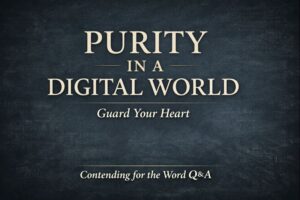⏱️ Estimated Reading Time: 2 min read
The Prosperity Gospel vs. the Biblical Gospel: A Clear Contrast
Is the prosperity gospel the same as the biblical gospel?
At first glance, its promises of wealth, health, and worldly success can sound compelling, if only you have enough faith and sow enough “seed.” Yet while this message attracts large crowds and stirs hope, it is not the gospel of Scripture. It is a dangerous distortion of the truth.
1. What the Prosperity Gospel Teaches
- Wealth and health are signs of God’s favor.
- Poverty and sickness result from a lack of faith or giving.
- “Faith” is treated as a force to manipulate outcomes.
- Giving money to ministries is portrayed as a guaranteed path to blessing.
This approach reimagines faith as a tool to obtain comfort rather than trust in Christ who saves.
2. Why It’s Not the Biblical Gospel
The true gospel calls us to repent of sin, trust in Christ alone, and follow Him, whether in abundance or in need
(Philippians 4:11–13). Scripture nowhere guarantees material prosperity for believers. Jesus warned that discipleship involves self-denial, sacrifice, and even suffering (Luke 9:23, John 16:33). The biblical gospel is not about manipulating God for gain but about being reconciled to Him through the life, death, and resurrection of Jesus Christ.
3. The Dangers of the Prosperity Gospel
- Shifts focus from God’s glory to personal gain.
- Misrepresents God’s promises, leading to disillusionment when blessings don’t come.
- Exploits the vulnerable by preying on fears and hopes.
- Undermines the sufficiency of Christ’s work on the cross.
4. How Christians Should Respond
- Test all teaching against Scripture (Acts 17:11).
- Proclaim the gospel that saves, not the message that sells.
- Encourage contentment and faithful stewardship over greed.
- Expose false promises with biblical truth (2 Timothy 4:2–5).
Conclusion
The prosperity gospel promises the world, but it cannot save the soul. The biblical gospel offers something far greater: forgiveness of sins, reconciliation with God, and eternal life through Jesus Christ. That is the good news worth treasuring,
proclaiming, and defending above all earthly riches.
Check out Contending for the Word Q&A for more and our YouTube for great content from our podcasts.
Dave Jenkins is happily married to his wife, Sarah. He is a writer, editor, and speaker living in beautiful Southern Oregon. Dave is a lover of Christ, His people, the Church, and sound theology. He serves as the Executive Director of Servants of Grace Ministries, the Executive Editor of Theology for Life Magazine, the Host and Producer of Equipping You in Grace Podcast, and is a contributor to and producer of Contending for the Word. He is the author of The Word Explored: The Problem of Biblical Illiteracy and What To Do About It (House to House, 2021), The Word Matters: Defending Biblical Authority Against the Spirit of the Age (G3 Press, 2022), and Contentment: The Journey of a Lifetime (Theology for Life, 2024). You can find him on Facebook, Twitter, Instagram, Youtube, or read his newsletter. Dave loves to spend time with his wife, going to movies, eating at a nice restaurant, or going out for a round of golf with a good friend. He is also a voracious reader, in particular of Reformed theology, and the Puritans. You will often find him when he’s not busy with ministry reading a pile of the latest books from a wide variety of Christian publishers. Dave received his M.A.R. and M.Div through Liberty Baptist Theological Seminary.




